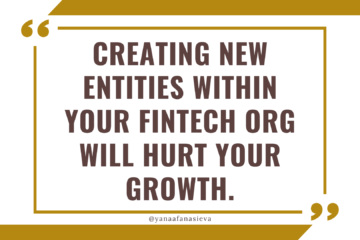Why Success in FinTech Compliance Has Little Correlation With the Amount of Resources and Even Less Dependency On Your Regulatory Knowledge
Many struggling compliance experts believe that to have better compliance and better risk management they need more time, better tools, and more resources. That is how you have probably been trained for years.
You have been led to believe that in order to deliver your best, most accurate, most comprehensive, and most resilient compliance program, it is important to be aware of all applicable laws and regulations, to have sufficient time to process and organize this information, and to have adequate resources to design and implement necessary controls and processes that are going to prevent the company from breaking the laws and facing the risks it does not want to face. Right?
But, if you have fallen into that trap of believing that compliance excellence depends on resources and time I am willing to bet that:
- you have been struggling to secure the resources you believe your department needs,
- you and your team are working increasingly long hours,
- your audit finding list keeps growing and the past findings remain unremediated,
- your senior management has repeatedly given you feedback that you need to be more entrepreneurial, more business-oriented, and more pragmatic;
- the result “nothing bad happened” has been taken for granted, and
- you have been thinking of changing jobs for the last few months now because you do not believe that the situation is going to change any time soon.
You see, if resources or team size were the determining factors for mistakes-free and efficient compliance, the biggest banks with the biggest budgets would not be the ones paying the highest fines and penalties for compliance violations.
If regulatory knowledge, massive documentation, access to best practices, or even professional integrity could help you find accurate answers and could help you arrive at evidence-based conclusions, and prevent you from missing huge mistakes, how is it possible that both BAFIN and Ernst & Young for years missed massive ongoing fraud within Wirecard, or why Mazars is no longer able to audit Binance, or where were the auditors of FTX?
Let me repeat: when you work in FinTech compliance your most valuable assets are NOT your regulatory know-how or your work ethic. Success in FinTech compliance does not come from your knowledge of laws and regulations and has very little correlation with the resources you spend.
FinTech startups follow well-known well-documented growth phases: from ideation to minimum viable product (MVP), followed by the product-market fit validation, and then hopefully result in the go-to-market and scale-up stage. Since business risks and compliance requirements at each phase are clearly different, the compliance function priorities must clearly focus on very specific risks and business needs for each phase of growth.
The vast majority of compliance and regulatory mistakes happen when you focus on the wrong things and are trying to fix them, and as a result, you are very likely to miss the invisible risks (and in some extreme cases, power abuse or fraudulent behavior) that can eventually kill the company.
Even without considering the extreme criminal cases, the problem of now knowing how compliance requirements and priorities must correlate with the stage of your compliance function evolution and the growth phase of your startup is that you will hit the professional plateau by delivering projects or making recommendations that your management does not value.
Career success in FinTech compliance has a strong correlation with your ability to deliver relevant results and outcomes that matter for your business and each phase of your compliance function evolution.
Unfortunately, many compliance professionals find themselves feeling stuck at each phase longer than they would like to and don’t always see what’s really obstructing their advancement.
The actions required to graduate from each phase and move your function upwards to the next level on the Compliance Pro Progress Pyramid are counter-intuitive.

Your progress has nothing to do with years of experience, compliance knowledge, or past education. These “secret skills” and strategies are not hard to learn or apply, it’s all about doing the right things at the right time: sometimes deeper specialization is powerful, sometimes delegation is needed, and in other cases, it is important to say “no” to management requests.
Depending on where you are on the pyramid, you may need to do more financial analysis, benchmarking, or better hiring and delegation skills. It is very hard to break the glass ceiling without mastering Compliance ROI calculations, for example.
If you work in FinTech compliance and feel unappreciated, unheard, and often overwhelmed, don’t worry. We have helped hundreds of other FinTech compliance professionals, just like you, gain clarity about where they are on the FinTech Compliance Evolution Pyramid and what their next priority should be at this stage.
If you’ve ever wondered why compliance officers are rarely promoted despite working very hard and needing to change companies to get ahead, you ABSOLUTELY need to attend this FREE training to uncover and remove the #1 INVISIBLE obstacle specific for each phase of your professional growth!


